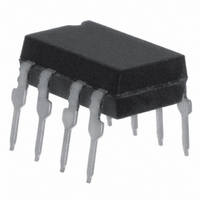IL300-DEFG Vishay, IL300-DEFG Datasheet - Page 2

IL300-DEFG
Manufacturer Part Number
IL300-DEFG
Description
OPTOCOUPLER HI GAIN WIDE BW 8DIP
Manufacturer
Vishay
Specifications of IL300-DEFG
Mounting Type
Through Hole
Isolation Voltage
5300 Vrms
Number Of Channels
2
Input Type
DC
Voltage - Isolation
5300Vrms
Current Transfer Ratio (min)
0.77% @ 10mA
Current Transfer Ratio (max)
1.18% @ 10mA
Current - Dc Forward (if)
60mA
Output Type
Linear Photovoltaic
Package / Case
8-DIP (0.300", 7.62mm)
Current Transfer Ratio
0.5 % to 1.1 %
Forward Current
10 mA
Maximum Fall Time
1.75 us
Maximum Rise Time
1.75 us
Output Device
PIN Photodiode
Configuration
1 Channel
Maximum Forward Diode Voltage
1.5 V
Maximum Reverse Diode Voltage
5 V
Maximum Input Diode Current
60 mA
Maximum Power Dissipation
210 mW
Maximum Operating Temperature
+ 100 C
Minimum Operating Temperature
- 55 C
No. Of Channels
1
Optocoupler Output Type
Photodiode
Input Current
10mA
Output Voltage
50V
Opto Case Style
DIP
No. Of Pins
8
Gain Db Max
1.181dB
Lead Free Status / RoHS Status
Lead free / RoHS Compliant
Voltage - Output
-
Current - Output / Channel
-
Vce Saturation (max)
-
Lead Free Status / Rohs Status
Lead free / RoHS Compliant
Other names
751-1293-5
IL300-DEFGGI
IL300-DEFGGI
IL300-DEFGGI
IL300-DEFGGI
Available stocks
Company
Part Number
Manufacturer
Quantity
Price
Company:
Part Number:
IL300-DEFG
Manufacturer:
Vishay
Quantity:
2 000
IL300
Vishay Semiconductors
Operation Description
A typical application circuit (Figure 1) uses an opera-
tional amplifier at the circuit input to drive the LED.
The feedback photodiode sources current to R1 con-
nected to the inverting input of U1. The photocurrent,
I
(I
The magnitude of this current is directly proportional
to the feedback transfer gain (K1) times the LED drive
current ( V
LED current to force sufficient photocurrent to keep
the node voltage (Vb) equal to Va.
The output photodiode is connected to a non-invert-
ing voltage follower amplifier. The photodiode load
resistor, R2, performs the current to voltage conver-
sion. The output amplifier voltage is the product of the
output forward gain (K2) times the LED current and
photodiode load, R2 ( V
Therefore, the overall transfer gain (V
the ratio of the product of the output forward gain (K2)
times the photodiode load resistor (R2) to the product
of the feedback transfer gain (K1) times the input
resistor (R1). This reduces to
The overall transfer gain is completely independent of
the LED forward current. The IL300 transfer gain (K3)
is expressed as the ratio of the output gain (K2) to the
feedback gain (K1). This shows that the circuit gain
becomes the product of the IL300 transfer gain times
the ratio of the output to input resistors
K1-Servo Gain
The ratio of the input photodiode current (I
LED current (I
K2-Forward Gain
The ratio of the output photodiode current (I
LED current (I
K3-Transfer Gain
The Transfer Gain is the ratio of the Forward Gain to
the Servo gain, i.e., K3 = K2/K1.
www.vishay.com
2
P1
V
V
P1
O
O
, will be of a magnitude to satisfy the relationship of
/V
/V
= V
IN
IN
=(K2 • R2)/(K1 • R1).
IN
= K3 (R2/R1).
/R1).
IN
/R1 = K1 • I
F
F
) i.e., K1 = I
), i.e., K2 = I
O
F
= I
). The op-amp will supply
P1
P2
F
/I
/I
• K2 • R2).
F
F
.
.
O
/V
IN
) becomes
P1
P2
) to the
) to the
∆K3-Transfer Gain Linearity
The percent deviation of the Transfer Gain, as a func-
tion of LED or temperature from a specific Transfer
Gain at a fixed
LED current and temperature.
Photodiode
A silicon diode operating as a current source. The out-
put current is proportional to the incident optical flux
supplied by the LED emitter. The diode is operated in
the photovoltaic or photoconductive mode. In the pho-
tovoltaic mode the diode functions as a current
source in parallel with a forward biased silicon diode.
The magnitude of the output current and voltage is
dependent upon the load resistor and the incident
LED optical flux. When operated in the photoconduc-
tive mode the diode is connected to a bias supply
which reverse biases the silicon diode. The magni-
tude of the output current is directly proportional to the
LED incident optical flux.
LED (Light Emitting Diode)
An infrared emitter constructed of AlGaAs that emits
at 890 nm operates efficiently with drive current from
500 µA to 40 mA. Best linearity can be obtained at
drive currents between 5.0 mA to 20 mA. Its output
flux typically changes by - 0.5 % /°C over the above
operational current range.
Application Circuit
+
Vin
R1
Vb
Va
+
-
U1
V CC
Figure 1. Typical Application Circuit
I F
lp 1
V CC
1
2
3
4
K1
IL300
K2
8
7
6
5
lp 2
V CC
V c
Document Number 83622
R2
+
-
U2
Rev. 1.5, 24-Mar-05
V CC
VISHAY
iil300_01
V out















